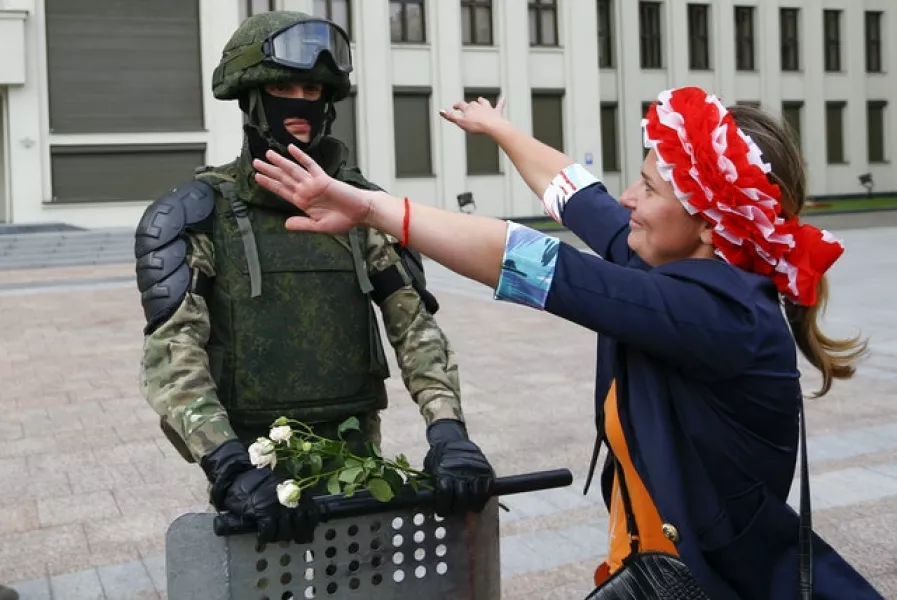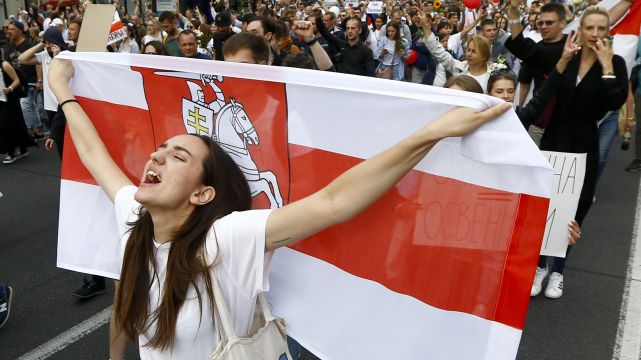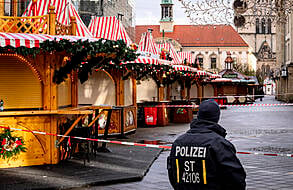Authorities sought to ease rising public fury by freeing at least 2,000 people who were jailed after earlier demonstrations.
Factory workers marched across the city shouting “Go away!” in a call for authoritarian president Alexander Lukashenko to resign after 26 years of iron-fisted rule that was extended in an election Sunday that protesters denounced as rigged.

Friday’s crowds grew to more than 20,000, filling central Independence Square.
About a dozen soldiers guarding the nearby government headquarters lowered their riot shields in what the demonstrators saw as a sign of solidarity, and women rushed to embrace and kiss the guards.
As the protesters rallied on the square, Mr Lukashenko dismissed them as puppets manipulated from abroad.
During a meeting with top law enforcement officials, he defended the crackdown as a justified response to violence against police by some of the protesters. The interior ministry said 121 police officers were injured.
He told officials, however, to avoid excessive force. “If a person falls down and lies still, don’t beat him,” Mr Lukashenko said.
The Belarusian leader cautioned people against turning out for protests, saying the country is facing foreign “aggression”.

“Don’t get out into the streets. You should understand that you and your children are being used as cannon fodder,” Mr Lukashenko said, alleging that people from Poland, the Netherlands, Ukraine and some members of Russia’s opposition were fomenting the unrest.
“Do you want me to sit and wait until they turn Minsk upside down?” he said. “We won’t be able to stabilise the situation afterwards. We must take a break, collect ourselves and calm down. And let us restore order and deal with those who have come here.”
Earlier, police did not interfere as the protesters marched across the city, reflecting Mr Lukashenko’s apparent attempt to assuage the opposition by stepping back from the violent police crackdowns seen across the country earlier this week.
The release by the interior ministry of about 2,000 of the nearly 7,000 people detained was seen as another move to defuse popular outrage. It said more would be freed.
Many who were released spoke of brutal beatings and other abuse by police, and some showed bruises on their bodies. Some of them wept as they embraced waiting relatives.
“The authorities are obviously trying to de-escalate the situation and ease the tensions, fearing that the furious industrial workers will take to the streets all across Belarus,” said Valiantsin Stefanovich of the Viasna rights centre.

Demonstrators have swarmed the streets ever since Sunday’s election in which officials reported that Mr Lukashenko won 80% of the vote to win a sixth term in office.
His main challenger, Sviatlana Tsikhanouskaya, who fled on Tuesday to neighbouring Lithuania, posted a new video in which she disputed the results of the vote and demanded that the government start a dialogue with demonstrators.
The ferocious crackdown has left hundreds injured since Sunday as police have dispersed the largely peaceful demonstrations with stun grenades, tear gas, rubber bullets and severe beatings. At least one person has been killed.
The brutal suppression of protests drew harsh criticism in the West. European Union foreign ministers said they rejected the election results and tasked officials with drawing up a list of people in Belarus who could face sanctions over their role in the crackdown.
“Work begins on sanctioning those responsible for violence and falsification,” tweeted EU foreign policy chief Josep Borrell.
Earlier, German foreign minister Heiko Maas said the EU wants to “significantly increase the pressure on Belarus.”

Thousands of factory workers who previously formed the core of Mr Lukashenko’s base have joined the protests, denouncing the police crackdown and demanding a new election, raising the prospect of a nationwide strike.
“Our entire shop voted against Lukashenko and then we suddenly learned that he won by a landslide,” 42-year-old assembly worker Dmitry Glukhovsky said outside the Minsk Automobile Plant, or MAZ.
“They not only have cheated us but also beaten us up, and no-one is going to accept that.”
Ms Tsikhanouskaya urged her supporters to stop protests in an earlier video that her associates said was recorded under pressure from law enforcement officials while she was still in Minsk.
The 37-year-old former teacher had joined the race to replace her husband, an opposition blogger, who has been jailed since May.







